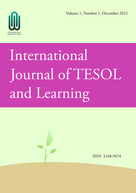


Volume 11 Issues 1-4 (2022-12-31)
Volume 10 Issues 3&4 (2021-12-31)
Volume 10 Issues 1&2 (2021-06-30)
Volume 9 Issues 3&4 (2020-12-31)
Volume 9 Issues 1&2 (2020-06-30)
Volume 7 Issues 3&4 (2018-12-31)
Volume 6 Issues 3&4 (2017-12-31)
Volume 6 Issues 1&2 (2017-06-30)
Volume 5 Issues 1&2 (2016-06-30)
The rapid increase of English language learners (ELLs) attending public schools in the United States calls for teacher education programs to adequately prepare pre-service teachers to meet the needs of this increasingly diverse student population. This study examines 26 mainstream pre-service teachers’ perceptions of their preparation for teaching ELLs. Findings revealed that the majority (24/26) of the mainstream pre-service teachers felt unprepared to teach ELLs due to the lack of ELL-related knowledge in course content and opportunities to apply ELL-related knowledge during their program of study. The study has significant implications for improving teacher education for diversity.
The number of English language learners (ELLs) is increasing rapidly in the U.S. There is a big academic achievement gap between ELL and non-ELL students, and ELLs lag behind their peers in almost all subjects. This study analyzes the role of charter schools in increasing the academic success of ELLs in light of theories of school success and ELL education. Qualitative and quantitative data were collected at a charter school which has a large number of ELL students. Results of this study reveal that charter schools can play an important role in closing the academic achievement gap between ELL and non-ELL students. At the end of the paper, some innovative ELL education methods that are being used in this charter school are described, and some implications to improve the academic success of ELL are provided as well.
This study examines the effects of learning French as a foreign language on the first language (L1) vocabulary skills of pre-kindergarten students, inclusive of those with special needs, from a sociocultural perspective. Prior research has focused on the challenges encountered in foreign language programs by students with special needs. However, no clear evidence has been found showing that students with special needs cannot learn a foreign language or that participation in a foreign language program results in L1 language loss. In this study, both pre-tests and post-tests of English vocabulary were conducted in addition to standardized tests in order to measure any changes in L1 vocabulary as students participated in the French program. Tests were also conducted to measure French vocabulary learning. Results showed that all students were able to learn French vocabulary, although special needs students’ scores were not as high as those of their peers. Also, results showed that no students suffered language loss in any tests of English vocabulary. Discussion focuses the learning that occurred in the communities of practice that were formed between the teacher, students, and research team. Implications address the question of exemptions for special needs students from foreign language programs.